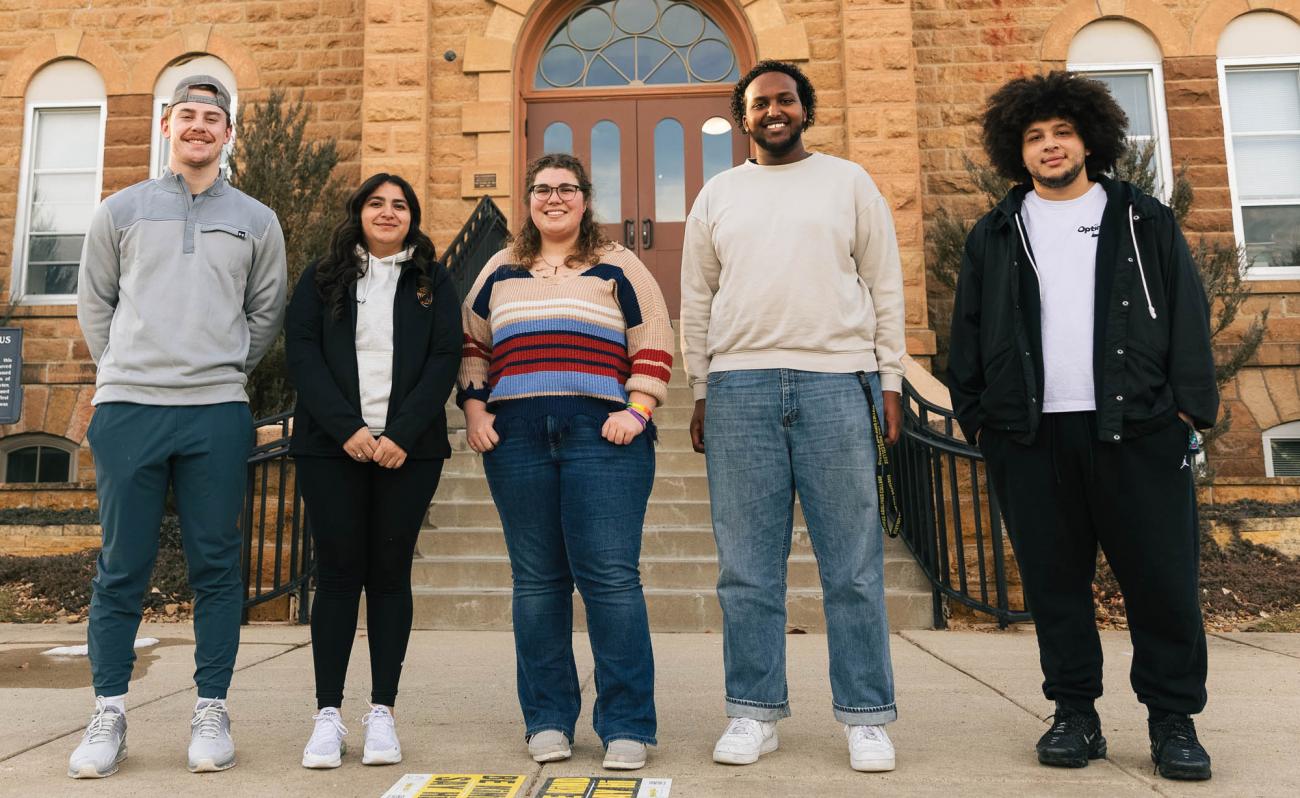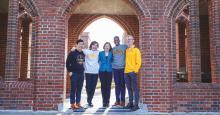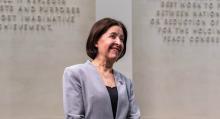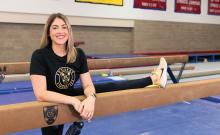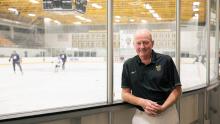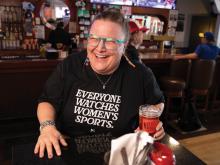They look like all of the other current Gustie students living their lives here on the Hill. You can’t pick them out of the crowd in the Caf. You won’t be able to pick them out of the crowd at Commencement. Their caps and gowns will fit just as well as anyone else’s.
But they are different. They are first-generation college students—those whose parents did not graduate from four-year college.
A generation ago, “first- generation” wasn’t a label. There was little awareness that first-gens have needs that are different than students whose parents graduated from college.
Today, we know differently.
Today, first-gen students are the fastest growing demographic in higher education. At Minnesota’s private colleges, 23 percent of students are first- generation college students. At Gustavus, it is 21 percent.
They are a diverse group, each on their own journey. Some are both first- generation college students and first- generation immigrants. “We all have different family backgrounds and reasons for being here,” says Brandon Hicks ’25. But they have shared qualities too, and lots to say about their time at Gustavus.
One thing they share, says Lupe Olague ’26, is “the dedication to our studies and everything we are involved with. It’s a superpower.” When you’re first-gen, college is not a given. It’s a privilege, and often a way to advance your socioeconomic status, sometimes your whole family’s. “Along with that comes the stress that can be seen among all first- gen students about the many outcomes that are based on their decisions.”
The pressures are great. So are the knowledge and cultural gaps. “Initially I was worried people would think less of me because I didn’t have the claim to legacy that Gustavus highly values,” says Torii Nienow ’24. “I was also worried that I would sound dumb or unprepared by asking questions it seemed everyone around me already knew the answer to. It’s easy for imposter syndrome to creep in.” Says Hicks, “I experienced barriers of the cultural and recreational variety. The average Gustavus student is of a different racial and socioeconomic makeup [than me], and therefore has much different experiences than I do. This made living and socializing at Gustavus somewhat unnatural when college began.”
He and the other Gustie students in these pages have leaned on their advisors, professors, friends, and support systems specifically for first-generation students. (See page 23.) This support is how Gustavus works for first-generation students. Says Olague, “You may feel like you can’t lean on anyone, but at Gustavus there are so many that will become your support system.”
But to benefit from the personal and community support of a highly relational Gustavus college experience, the financial support needs to be there first. The biggest barrier to receiving that financial support is the perception that it isn’t there, that Gustavus and other Minnesota private liberal arts colleges are less affordable than state-funded ones.
Yet each student profiled here mentioned the financial aid package they received from Gustavus made the college as affordable or more affordable than nearly every other college option.
The journey hasn’t been perfect. Some of these first-gens mentioned they’d like to have known more about college financing to avoid the kinds of surprises that can derail a student. Some mentioned wanting more visibility around campus of first-gen students, faculty, and staff. Some could have used more guidance around college processes as well as the FAFSA (Federal Application for Student Aid).
However, they all say it was the scholarships that got them to the Hill, and the people and academic excellence that keep them here. Says Hicks, “It was the financials and opportunities that mattered.” And there’s no lingering shame in being first-gen, especially at Gustavus, says Nienow. If she could talk to prospective first-gens, she’d say, “There is a large community of students like you at Gustavus that care about you and want to see you succeed.”
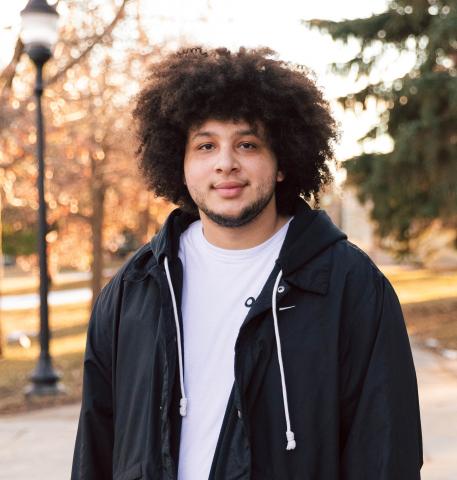
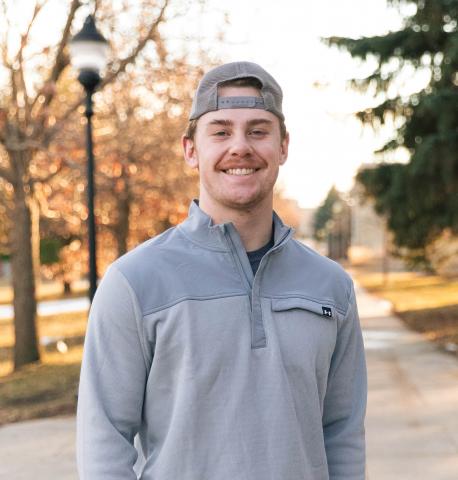
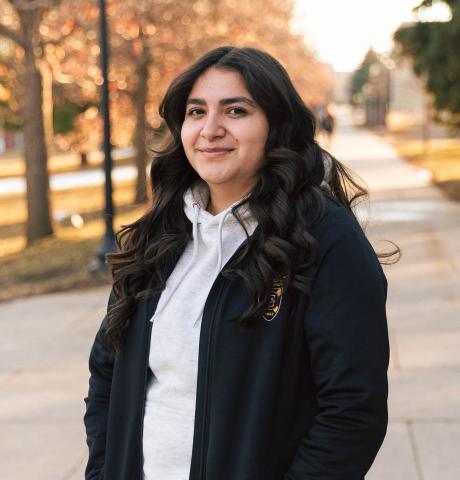
BRANDON HICKS ’25 He graduated high school a year early, in the top 10 percent of his class, after attending high schools in the Dallas- Fort Worth area. “Since the work I put in earned scholarships from many institutions, I essentially had complete freedom in my college decision-making process,” he says. “Gustavus provided the best financial package among the out-of-state schools I applied to.” His scholarships cover a large part of his tuition. He pays for his meal plan, lodging, and tuition increases with campus and summer jobs, plus subsidized loans. While his parents are fully supportive— including of what may be perceived as an “unconventional major” (double major, actually: French, plus Latin American, Latinx, and Caribbean Studies, with a minor in African/African Diaspora Studies), “I navigated college independently.” That includes figuring out the financials, the processes, and the cultural differences of being a Black student from predominantly Black high schools in urban Texas who finds himself at a predominantly White college in rural Minnesota. That has not been without its challenges. Still, he says, “It’s important you go to college for what is important to you, whatever that may be. For me personally, it was the financials and opportunities that mattered. And many opportunities have been opened for me by great professors.”
CONNOR WIBERG ’25 “Hard work and dedication.” That’s what being a first-generation college student is all about, Wiberg says. Growing up in South St. Paul and Apple Valley, his parents, who did not finish college, encouraged him to plan for it. They also loved watching him play sports. “So being able to be a part of the Gustavus baseball team here really made them excited when I decided to go here.” His desire to earn a college degree (major: Exercise Physiology) came from knowing his parents’ regret at not finishing themselves. He also wanted to extend his time on the ball field. The outfielder pays for college with the help of loans, federal and state financial aid, and long hours at summer jobs, though his parents will pitch in if he needs it. They definitely helped him with time management skills when he struggled academically during his first year. Mostly, though, his motivation to put in the work comes from within, shaped by the message he’s been hearing from his parents since the ninth grade: Be the best person and player and student you can be. “Everyone always has a goal as a first-gen student, and mine is to make my parents proud by graduating. I know they were proud of me when I decided to go to college, especially at Gustavus.”
LUPE OLAGUE ’25 As a first-generation college student and an out-of state student (from Yerington, Nevada, population 3,048), a supportive community is a true necessity for this Exercise Physiology major and Spanish minor. “The thing that I liked as I did my college search was that Gustavus holds community and engagement in the core of its heart. The faculty, staff, and students make it feel like a home away from home.” She also liked the ability to be done in five years or less, which means she’ll be able to help take care of her immigrant parents more quickly. They were reticent about her studying so far away but otherwise supportive. “Both my parents would tell us about their childhood, and how they had to leave their dreams of a higher education for a better future for our family. Seeing my parents work hard to make a living for my siblings and I allowed me to start thinking differently at a young age about my dream.” Her admission counselor, Alan Meier ’87, the only person she knew when she showed up on campus, helped her discover different opportunities to get involved. Now she is co-executive of traditions for the Campus Activities Board as well as the 2023 St. Lucia, which is a huge source of pride for her. “In that moment, I realized that a first-gen like myself is able to do anything they put their mind to.”
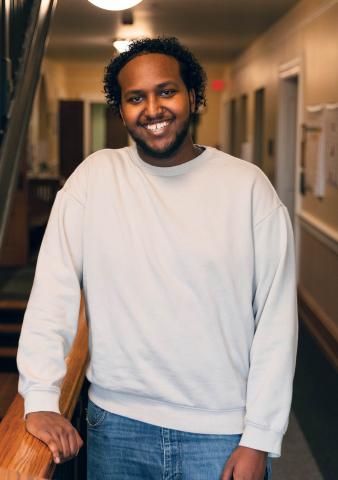
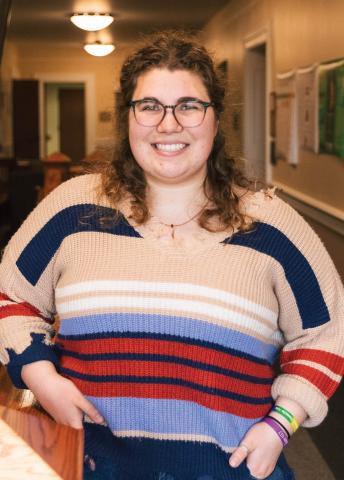
You already earned your place here. You don’t need to prove yourself more. You belong just as you are.
—Nienow
MUKHTAR OSMAN ’24 “The father of a friend of mine helped me out in my process of picking a school,” he says. What sold Osman on Gustavus was meeting Tom Flunker, director of the Center for Inclusive Excellence. “We ended up eating lunch with him. The conversation made Gustavus feel like an open and welcoming place. It was one of the main reasons I chose to go here.” Osman, who is also a first-generation immigrant, grew up in Rochester and pays for college with work and internships, “but that would not be possible without the financial aid and scholarships I receive,” he says. His parents have always had a “Sky’s the limit!” approach to his future. He thought he would study medicine. He ended up in computer science. His brother recommended the major, the College let him explore. “Gustavus helped me to discover what I actually enjoy and want to do.” Like other seniors, he started in 2020—“The Pandemic Year.” It was tough. “A lot of the friends I made during that year were really by chance,” he says. As the world eased up, joining student orgs “helped me connect with other diverse students on campus and feel like I was really a part of the community here.” He’s been a Peer Assistant, co-chair of the Diversity Leadership Committee, and community outreach for the Pan-African Student Organization.
TORII NIENOW ’24 Her motivations to attend college were her insatiable curiosity and her desire to be a good role model for her younger brother. She earned an associate’s degree while still in high school, and has paid for Gustavus with scholarships, savings, and jobs as Geology Museum coordinator, teaching assistant, and CF. Gustavus interested her because of the Nobel Hall addition and renovation. “I knew I wanted to study something in the sciences, and it was very exciting to be in a newly renovated building.” When she told her parents she was going to study geology, “They were both very supportive, but I could tell they were worried about what I could do with a career studying rocks.” (They didn’t need to; she’s headed to the University of Delaware to get a fully funded PhD in “rocks”.) She was worried she’d sound dumb or unprepared “by asking questions that it seemed everyone around me already knew the answer to.” And that’s her big advice to incoming first-generation students: “Don’t be afraid to ask questions! There is no such thing as a dumb question, otherwise I would have asked it.” She adds, “You already earned your place here when you were accepted. You don’t need to prove yourself more. You belong just as you are.”
First-gen status isn’t always analagous with financial need, but there is a strong correlation. Here’s what we know about—and do for—Gustie students today.


